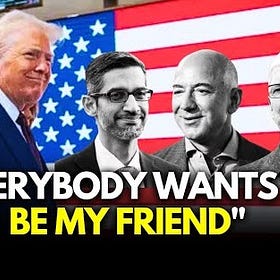AI Strategy Schism in the USA
Trump's tech fraternity squares off against Biden's regulatory framework and each other. This early in-fighting marks a murky AI strategy for the new administration.
What a tumultuous month to kick of this year of AI! From trade to scifi homages to infighting from the Republican techbros, it might be time to get an AI newscaster to stay on top of this 24 hours a day.
Trumping the Executive Order on AI
The former U.S. Executive Order 14110, which focused on AI development and safety, has been repealed under President Trump's administration. This order had established requirements for testing and evaluating certain advanced AI systems, while also directing federal agencies to create AI governance frameworks and safety standards. According to reports, many of the initiatives required by the order were already put into place before its repeal. Additionally, Elon Musk has reportedly announced plans for dramatic reductions in federal agencies, stating his intention to decrease their total number from 428 to 99.
Trade restrictions from Biden administration
In the final week of his presidency, Joe Biden's administration implemented new export control rules targeting AI-related technologies, aiming to regulate the export of advanced AI chips. These measures require authorizations for exports, reexports, and transfers involving a broad set of countries, aiming to prevent sensitive technologies from enhancing military capabilities abroad.
Stargate Opened
Following the announcement of the $500 billion Stargate AI infrastructure project—a collaboration between OpenAI, Oracle, and SoftBank—Elon Musk publicly questioned the project's financial foundations. Musk claimed that SoftBank had secured less than $10 billion for the initiative, a statement refuted by OpenAI's CEO, Sam Altman, who emphasized the substantial commitments from investors. This initiative involves collaborations between OpenAI, Oracle, and SoftBank, with an initial $100 billion investment to construct advanced AI data centers in Texas. The project is expected to create over 100,000 jobs in the U.S. over the next four years.
ByteDance on the Move
Amid these developments, ByteDance, the owner of TikTok, plans to invest over $12 billion in AI infrastructure in 2025. This includes $5.5 billion allocated for AI chips in China and $6.8 billion to enhance its model training capabilities using Nvidia chips internationally. This move comes as ByteDance faces pressures from U.S. export controls limiting the availability of advanced AI chips to China. Naturally, this leans in to the potential TikTok ban Trump may play a pivotal role in stopping.
Trump Administration AI Strategy
The administration's approach to AI regulation isn't just unclear – it's being shaped by what we might call the "Fratboy Technocrats": Musk, Thiel, McNealy, Andreessen, Ramaswamy, Sacks, Lonsdale, and their cohort. These aren't your stereotypical Silicon Valley liberals. They represent a new political class that combines technical expertise with deeply conservative values, some predating even the 1990s. In general, you can probably point to the Biden Executive Order to see the opposite direction the new administration will take.
Their influence extends far beyond traditional big tech and government boundaries. Consider the recent appointment of Sriram Krishnan, a former Andreessen Horowitz partner, as Senior Policy Advisor for Artificial Intelligence. Paired with crypto and AI "czar" David Sacks, these appointments signal a clear intention: minimal regulation, maximum market freedom.
The Schism
The parnership between OpenAI and Trump is going in full swing. Musk, with a big ego, does not seem to be taking this well. He co-founded OpenAI way back, but departed due to disagreements over its direction, has publicly questioned the project's financial viability.
He specifically targeted SoftBank's financial capacity, asserting that the company lacks the necessary funds for such a massive investment.This public exchange is the latest episode in a long-standing rivalry between Musk and Altman. After leaving OpenAI, Musk has been critical of the organization's shift from its original non-profit mission, even initiating legal action to prevent its transition to a for-profit model. Musk has established a competing AI company, xAI, further intensifying the competition between the two tech leaders.
State Regulation Emerges in Texas
As the Trump administration dismantles federal AI oversight, Texas's TRAIGA could create one of the nation's strictest regulatory frameworks, with particular implications for OpenAI's $500 billion Stargate project. While the bill's sandbox provision offers 36-month immunity periods for AI development, companies must still submit detailed risk reports and mitigation plans to the Texas AI Council, which can revoke protections if projects pose public harm. Even with temporary sandbox protection, Stargate's planned data centers would ultimately need to comply with TRAIGA's comprehensive restrictions on manipulative AI, biometric demographic inference, social scoring, and deepfake generation—or face penalties up to $200,000 per violation plus $40,000 daily for ongoing noncompliance. Unlike Colorado's more limited AI Act or California's vetoed SB 1047, TRAIGA's scope extends beyond algorithmic discrimination to create a comprehensive state-level governance structure that could influence pending legislation in other states like New York, where lawmakers are focused specifically on regulating large-scale AI models.
Takeaway
The Stargate project itself has garnered significant attention, not only for its scale but also for its strategic importance in enhancing U.S. competitiveness in AI technology. Despite Musk's skepticism, other industry leaders, including Microsoft CEO Satya Nadella, have affirmed their commitment to substantial investments in AI, signaling strong support for the initiative. Still, what about all the transport and production costs it will take to build these data centers in Texas? Innovation and sustainability needs to be given greater precendence, especially with technocrats who want to scale up AI with minimal guardrails and environmental protections. Read on to learn more on how this may impact AI regulation in the U.S.
Fratboy Technocrats Bungle AI Regulation in America
Back in 2016, Silicon Valley decried him. Now they're kneeling before the king. Each Big Tech company has anointed him with a million dollars. His inauguration is set to break records in terms of the sheer volume of money donated by these corporations. The Trump tax cuts have just been







